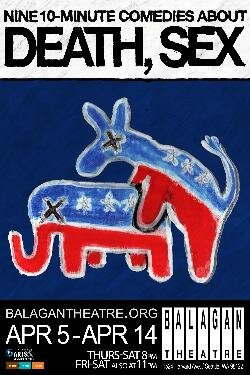June 22, Grassroots opens at the Harvard Exit on Capitol Hill, after having had its world premiere at SIFF. That’ll make the Harvard Exit a Gyllenhaal & Gyllenhaal establishment, since Maggie Gyllenhaal stars in Hysteria, which is running there right now, and Grassroots was directed by Gyllenhaal père, Stephen. Gyllenhaal will be at all showings of his movie from Friday, June 22 to Sunday, June 24.
As Stephen Gyllenhaal sees it, Grassroots is meant to be an inspiring film about the little guy pushing back–“even though ‘too big to fail’ wasn’t around when I started making Grassroots,” he writes at HuffPo, “the idea of a bully rationalizing his right to run a playground was.”
There’s a curious tension in Grassroots between this urge to broad-brush a heroic uprising against some suitably powerful figure, and the movie’s smaller-scale personalities, their tinpot aspirations and quixotic conflicts. As an example of tender rapprochement, there’s a late scene where one character accepts a ride in another’s car. In another director’s hands, that could be farce, or satire, but from Gyllenhaal, it feels like an implicit admonition for us all to grow up and work for the common good.
The story of Grassroots hews in reworked-for-movies fashion to the actual history of Grant Cogswell’s surprisingly unthought-out, one-issue run for Seattle City Council in 2001, against sitting Councilman Richard McIver. As the movie tells it, Monorail monomaniac Cogswell has no traction in his race, until his handler Phil Campbell hits upon the idea of getting free publicity by suing the City of Seattle. Chutzpah!
That plus Grant’s penchant for roaming around town in a polar bear suit–now part of a Twitter marketing strategy–is the sort of thing that energizes disaffected youth, who come out of the hipster woodwork to get involved in Cogswell’s campaign. Gyllenhaal gets, for what’s being called a comedy, a remarkably sober-sided performance from Jason Biggs as Campbell, the man who has to wrangle his obstreperous candidate, try to keep his relationship on life support, and ride herd on a gang on campaign volunteers.
Joel David Moore, though, never really hits his stride as Cogswell–he’s either fired up or sulky throughout much of the film, and he’s not very good at “fired up.” Cedric the Entertainer, as McIver, is far more congenial, thoughtful, and open to discussion, and you can’t shake the feeling that, yes, he’s a better politician than this crank.
Despite turning famed watering hole the Comet Tavern into a coffee house, Gyllenhaal otherwise keeps the movie’s visual sensibility fairly indie; people look suitably scruffy, the streets cold, the crisp mountains and early fall sunsets beautiful. Even Tom Arnold fits right in as a grumpy, harried bartender.
As Gyllenhaal points out, his set-in-2001 film points to much that would lie in the future: Even when he started work on it, he writes, “I couldn’t have predicted an Occupy Wall Street Movement and the issues it’s raised, nor the surreal Republican debates, Romney’s etch-a-sketch journey and the Democrats’ gentle drift towards the Tea Party.”
I’m not so sure prediction is the right word–these preoccupations, the tendency to construe events to fit a narrative, seem woven into Grassroots. Yes, Seattle and populism go together (we founded the Tea Party, after all) but when you look at what Gyllenhaal ignored from Phil Campbell’s book, Zioncheck for President, there’s a consistent up-with-youth-activism theme that came from somewhere besides burnt-out-wreck Campbell. He had penned a cautionary tale about being caught in the grip of charismatic ideologies and not dealing constructively with mental problems.
As he told Seattlest back in the day: “What did we accomplish? Nothing. We lost. Grant quit politics and I left town, end of story.” (That said, Campbell is equable when it comes to the distance between his and Gyllenhaal’s take: “Hollywood Gutted My Book, But That’s OK.”)
Personally, I like Campbell’s flamethrower approach, and miss the spectre of Marion Zioncheck, who hovered over Campbell’s tragicomedy to provide proof that as bad as things get, there’s usually someone out there who’s got it worse. It gave context to Cogswell’s rantings about the Monorail’s purity v. other modalities (this cannot play especially well with today’s hipster Seattleites who can’t wait for the fatcats’ gold-plated lightrail to be extended). Besides, Campbell implicated himself in “going off the rails on the crazy train” that was the Cogswell campaign–and, by extension, the idea of being fired up too much by a charismatic or forceful leader.
For all its faults, Campbell’s book undertook to tell you the truth–about many things, including starting a campaign from scratch, the symptoms of bipolar disorder, transportation infrastructure, and the history of Northwest populism. Grassroots seems to want to dispense with the messiness in favor of a “small is beautiful” parable. It pulls this off, mostly (though, the introductions and exits for a few too many characters seem to have hit the editing room floor). With distance and time, it may even improve. It’s just hard not to imagine–knowing of the real-life Cogswell’s move to Mexico City–that that’s Gyllenhaal in the polar bear suit, shouting about things only beginning.
